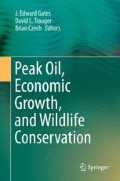Abstract
Peaking of the world’s oil supply is resulting in economic, social, cultural, and environmental instability on a global level. Individuals, businesses, and entire countries are attempting to maintain economic growth and preserve our current way of life for as long as possible. Government attention is turned toward averting economic collapse and obtaining energy resources, while the people are concerned about job security and subsistence. Environmental concerns are receiving the least attention by the majority of people. The environment is being ravaged by an aggressive quest for more fossil fuel resources to support a growing population and sustain economic growth by a society that knows no other way to live and is utterly dependent on oil. Addressing current environmental problems is already a challenge for conservationists, because societal priorities reside elsewhere or resolving these issues directly impacts certain powerful economic interests. The environmental community, including many professional societies and conservation organizations, as well as a number of government agencies and private companies, will need to step up their efforts to address global impacts of oil depletion if they hope to continue to protect living natural systems and the environment. Unfortunately, societal capacity to support these vital efforts is diminishing due to the buildup of pervasive economic pressures from escalating higher costs of living in response to higher prices for energy.
Access this chapter
Tax calculation will be finalised at checkout
Purchases are for personal use only
References
Brown LR (2006) Plan B 2.0: rescuing a planet under stress and a civilization in trouble. W. W. Norton and Company, New York
Cairns J (2005) Scientists, time management, and global environmental crisis. Sci Soc 4:121–128
Czech B (2000) Economic growth as the limiting factor for wildlife conservation. Wildl Soc Bull 28:4–15
Ehrenfeld D (2006) Friendly fire. Resurgence 239:23–25
Ehrlich PR, Ehrlich AH (1990) The population explosion. Frederick Muller Ltd, London
Epstein PR, Selber J (eds) (2002) Oil: a life cycle analysis of its health and environmental impacts. The Center for Health and the Global Environment, Harvard Medical School, Boston
Gates JE, Dawe NK, Erickson JD, Farley J, Geist V, Hands H, Magee P, Trauger DL (2006) Perspectives on The Wildlife Society’s economic growth position statement and the development process. Wildl Soc Bull 34:507–511
Government Accountability Office [GAO] (2013) The federal government’s long-term fiscal outlook: spring 2013 update. GAO −13-481SP. http://www.gao.gov/products/GAO-13-481SP. Accessed 9 Sept 2013
Heinberg R (2003) The party’s over: oil, war and the fate of industrial societies. New Society Publishers, Gabriola Island
Heinberg R (2007) Peak everything: waking up to the century of declines. New Society Publishers, Gabriola Island
Hirsch RL, Bezdek R, Wendling R (2005) Peaking of world oil production: impacts, mitigation, & risk management. Science Applications International Corporation (SAIC), San Diego
Klare MT (2001) Resource wars: the new landscape of global conflict. Henry Holt and Company, New York
Klare MT (2004) Blood and oil: the dangers and consequences of America’s growing petroleum dependency. Henry Holt and Company, New York
Kunstler JH (2005) The long emergency: surviving the converging catastrophes of the twenty-first century. Atlantic Monthly Press, New York
Kunstler JH (2013) Too much magic: wishful thinking, technology, and the fate of the nation. Atlantic Monthly Press, New York
Leeb S (2006) The coming economic collapse: how you can thrive when oil costs $ 200 a barrel. Time Warner Book Group, New York
Leggett J (2005) The empty tank: oil, gas, hot air, and the coming global financial catastrophe. Random House, New York
Mills JH, Waite TA (2009) Economic prosperity, biodiversity conservation, and the environmental Kuznets curve. Ecol Econ 68:2087–2095
Naidoo R (2004) Economic growth and liquidation of natural capital: the case of forest clearance. Land Econ 80:194–208
Naidoo R, Adamowicz WL (2001) Effects of economic prosperity on numbers of threatened species. Conserv Biol 15:1021–1029
National Wildlife Federation [NWF] (2005) Conservation directory 2005–2006: the guide to worldwide environmental organizations. Island, Washington, DC
Pergams ORW, Czech B, Haney JC, Nyberg D (2004) Linkage of conservation activity to trends in the U.S. economy. Conserv Biol 18:1617–1623
Prugh T, Flavin C, Sawin JL (2005) Changing the oil economy. In: The Worldwatch Institute (ed) State of the world 2005: redefining global security. W. W. Norton and Company, New York, pp. 100-119
Roberts P (2004) The end of oil: on the edge of a perilous new world. Houghton Mifflin Company, New York
The Community Solution Staff (2005) Peak Oil—peak economics. http://www.resilience.org/stories/2005-05-22/peak-oil-peak-economics. Accessed 9 Sept 2013
Trauger DL, Czech B, Erickson JD, Garrettson PR, Kernohan BJ, Miller CA (2003) The relationship of economic growth to wildlife conservation. Wildlife Society Technical Review 03-1. The Wildlife Society, Bethesda
Union of Concerned Scientists [UCS] (2005a) How oil works. www.ucsusa.org. Accessed 1 May 2006
Union of Concerned Scientists [UCS] (2005b) The hidden costs of fossil fuels. http://www.ucsusa.org/clean_energy/our-energy-choices/coal-and-other-fossil-fuels/the-hidden-cost-of-fossil.html. Accessed 1 May 2006
U.S. Energy Information Administration [EIA] (2007) Annual energy outlook 2008: with projections to 2030. Report #: DOE/EIA-0383(2008). http://www.eia.gov/oiaf/archive/aeo08/index.html/. Accessed 1 Dec 2007
Author information
Authors and Affiliations
Corresponding author
Editor information
Editors and Affiliations
Rights and permissions
Copyright information
© 2014 Springer Science+Business Media New York
About this chapter
Cite this chapter
Trauger, D., Jackson, R. (2014). Response of Professional Societies and Conservation Organizations to Peak Oil and Economic Growth. In: Gates, J., Trauger, D., Czech, B. (eds) Peak Oil, Economic Growth, and Wildlife Conservation. Springer, New York, NY. https://doi.org/10.1007/978-1-4939-1954-3_14
Download citation
DOI: https://doi.org/10.1007/978-1-4939-1954-3_14
Published:
Publisher Name: Springer, New York, NY
Print ISBN: 978-1-4939-1953-6
Online ISBN: 978-1-4939-1954-3
eBook Packages: EnergyEnergy (R0)

